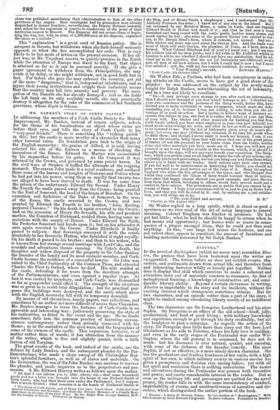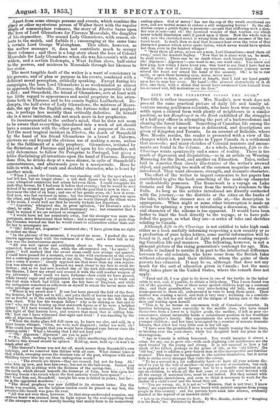ELE C T A. * IF the novel of _Rockingham (which
we never saw) resembles Elec- tra, the praises that have been bestowed upon the writer are exaggerated. The fiction before us does not exhibit events, cha- racters, and sentiments drawn from actual life, and therefore fresh and interesting however wildly or loosely pat together. Neither does it display that skill which contrives to make a coherent and attractive story out of materials common to romances, by dint of metaphysical training, a knowledge of constructive art, and consi- derable literary ability: Beyond a certain cleverness in writing, Electra is improbable in its story and its incidents, without the exciting interest which strangeness sometimes attains. But for two characters, and an episode rather than a part of the story, it might be ranked among circulating library novels of en indifferent class.
The two characters are Sir Peregrine Leatherhead and his niece Sophia. Sir Peregrine is an officer of the old school—bluff, jolly, goodnatured, and fond of good living ; with military knowledge and experience enough to get through his duty creditably, but not the headpiece to .plan a campaign. As regards the action of the story, Sir Peregrine does little more than carry out the hero Lord Glenarlowe as his aide to Palermo, where his lady love is residing; and even in the early stages of the Peninsular war under Wel- lington, where the old general is in command, he does not do much: but his discourse is ever natural, quaint, and amusing, with some of the richness of the broader comedy. His niece Sophia, if not so effective, is a more nicely-drawn character. She has the goodnature and fearless frankness of her uncle, with a high spirit of her own, to which military society in various service has given a promptness and decision rare among ladies; yet with all her spirit and resolution there is nothing unfeminine. The scenes and adventures during the Peninsular war possess both invention and power, and excite considerable interest in the reader. But as soon as the military life and personages are quitted for the novel proper, the reader falls in with the same inconsistency of conduct, improbability of events, and unattractiveness of narrative and dis- course, which distinguished the earlier portion. of the book. • Electra: a Story of Modern Times. By the Author of " Rockingham." With Illustrations by Lord Edward Fitzgerald. In three volumes. Published by Bentley. Apart from some strange persons and events, which combine the gipsy or other mysterious person of Walter Scott with the regular staple of commonplace romance, the story of Electra turns upon the love of Lord Glenarlowe for Florence Moorsdale, the daughter of his stepmother. The second Lady Glenarlowe, with reason, ob- jects to the match, and forbids it ; encouraging at the same time a certain Lord George Walsingham. This affair, however, as the author manages it, does not contribute much to occupy three volumes ; and there is a long story about the love of Colonel Moorsdale for Lady Glenarlowe when she was his cousin's wife and widow, and a certain Redempta, a West Indian slave, half-sister to the peeress, and mistress to Moorsdale through her likeness to her sister.
The most tangible fault of the writer is a want of consistency in his persons, and of plan or purpose in his events, combined with a deficient moral perception, critically speaking. Except during his campaigns, the hero Lord Glenarlowe is so weakminded as almost to approaoh the imbecile. Florence, the heroine, is generally a bit of a flirt ; and Staunfield, the friend of Glenarlowe acts at least with too little regard to appearances and social propriety in his atten- tions both to Florence and to his cousin Sophia Leatherhead. Re- dempta, the half-sister of Lady Glenarlowe, the mistress of Moors- dale, the spy for the English army, the fortune-teller and prophet- ess, is perhaps less morally than critically defective. In herself she is a mere imitation, and not much more in her prophecies. So inconsequential is the author's mind, that he does not seem to be aware that everything introduced into a work of art should have a connexion with the other parts, and a purpose of its own. Yet the most tragical incident in Electra, the death of Staunfield by the hand of his friend Glenarlowe in a brawl at Palermo, answers no end beyond the obvious use of making a scene, unless it be the fulfilment of a silly prophecy. Glenarlowe, irritated by the flirtations of Florence and played upon by his stepmother, not only determines to follow Sir Peregrine to Portugal, but gives a letter disclaiming all intentions upon the hand of Florence. Having done this, he drinks deep at a mess dinner, in spite of Staunfield's remonstrances, and afterwards goes to a masquerade. Here he falls in with a lady of rank and doubtful character, who is beset by another mask.
"When I joined the Contessa, she was standing still by the spot where I had left her, but no longer alone : a tall dark figure was by her side, and
some whispered contention had arisen between them. I could recognize his dark-blue favour, fer I had seen it before that evening; but he would be mad indeed if he crossed my path once more with the goal that is now in view. I drew near the idol of an hour ; and one of her gentle arms, oh ! how it trem- bled now, was fast enclosed in mine; but the stranger's iron grasp was upon the other, and though I could distinguish no words through the silken wave of his mask, I could well see that he sternly forbade her departure. " Augustus,' whispered she, in great agitation, for Heaven's sake be silent, be calm. None but you shall accompany me ; but remember that I shall lie ruined if we are noticed or recognized.'
"I would have led her noiselessly away, but the stranger was more im- portunate, more determined than before; and a suppressed cry of pain from the Contessa warned me that he would resort to extremities rather than suf- fer her to accompany me.
" Oh! defend me, Augustus !' muttered she; 'I have given him no right to molest me thus.'
"In the phrensy of the moment, I required no more. I pushed the un- known aggressor back with the rudeness of a blow, and a blow full iu my face was the instantaneous answer.
"All was now uproar and confusion about us. We were surrounded separated, hurried to the door, while the oft-repeated cry, La spade ! la spade ! ' well marked that the sword alone could now avenge our quarrel. I could have paused for a moment, even in the wild excitement of the crisis, but a contemptuous exclamation at my side, 'Sono Inglesi et l'onor Inglese non e come it nostro ! ' clearly apprized me that more than my own reputa- tion was already at stake. I pressed my mask closer to my face to avoid de- tection; and as we had now reached one of the dark side-streets adjoining the theatre, I drew my sword and crossed it with the still readier weapon of my. adversary. How could we have forborne—how could we have paused, while twenty eager and self-appointed seconds were urging us to wash out the foul stain which had fallen upon the fair fame of England, and while my antagonist remained as solicitous as myself to retain the never more wel- come privilege of our disguise ? " Where is my sword now ? It can but have pierced the fold of the flow- ing domino, for I fight not to kill ; and yet a thrill of horror has run through me as fearful as if the subtile blade had been buried up to the hilt in my own chest. Wby has his weapon fallen ? why is he sinking so fast and so low? why are they bearing up that stalworth figure as if he were a helpless infant ? If I have wounded him indeed, it cannot be seriously. Turn the dim light of that lantern here, and remove that mask that is stifling him. Oh! how can I have witnessed that sight and lived ? I was kneeling by the side of Algernon Staunfield!
" When the dusky glare fell full upon us, be knew me also, and said, in a faint hoarse whisper, 'Glen, we were well disguised ; rather too well, eh ? Who could have thought that you would have changed your favour since the gaming-table ! What a blessing that I did not hurt you.' " Oh ! Algernon ! Algernon ! are you in pain ? ' " 'No, Olen, nothing to signify, only a little smothering about the chest. I believe this wound should be opened. Hold up, man, hold up—it won't be ; Mich after all.'
"the General's house was not far off, much nearer than Staunfield's own I lodgings and we removed him thither with all care. What dismal voice is that which, sweeping across the desolate vale of the past, whispers with such thrilling terror into my ear those unforgotten words?
. . . . ' The swords are drawn—they are crossed, but not for long. Ah ! raise him up now, and bear him away, but not to the ball-room. Cannot you see that his life is ebbing with the fleetness of the spring-tide Will the earth, which shrank beneath the footsteps of Cain, bear him upon her heaving bosom who struck where the first assassin would have spared Oh! trust him not, Staunfield : tonight his arm is folded in yours; but he— he is the appointed murderer.' . . . .
"The dread prophecy was now fulfilled to its sternest letter. Ere the house was reached, ere the helpless burden could be placed on my bed, the priceless life-breads was gone for ever.
"All was not over then, however. In that sleep-enshrouded mansion, one anxious heart was aroused from its light repose by the soul-appalling tread of the strangers who were heavily bearing that manly form to its momentary
resting-place. God of mercy has not the cup of thy wrath overflowed ere now, and are mortal senses to endure a still surpassing horror ? By the all- stirless corpse a gentle figure is prostrate—around that stiffening neck a slen- der arm is cast—and oh! the agonized wonder of that tearless eye which never beheld dissolution until it gazed upon it there. Now the whole tale is told; now the cherished secret is wrung from the inmost recesses of the tor- tured heart. Is death then so deaf that it cannot hear even the voice of that distracted passion which never spake before, which never would have spoken bu!.,,
thus, even in the faintest whisper ?
"'Send them all away, as you are a man, Lord Glenarlowe—send them all away,' cried the desolate Sophey. 'Now that he is alone with us, he must, he shall revive. There can be no death where such beauty lingers. . . . . Oh! Algernon ! Algernon!---one word to me, one word only. You know not how tong, how wildly I have loved you. One word to say that I have had no share in this deed of horror; that my senseless, causeless jealousy never stirred the heart nor armed the hand of the assassin. Oh.! is he to rise again, or open those beaming eyes, never, never more !' "She grew so faint, so exhausted at length, that I laid my hand gently upon her to urge her away. My hand !—She glanced abstractedly at it at first, and then, with a shriek that would have awakened Cain himself from his accursed rest, fell motionless on the floor."



























 Previous page
Previous page